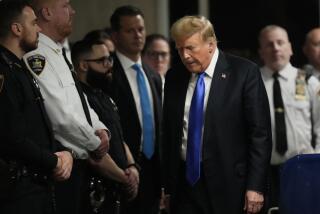Miami Police Jury Has Verdict That Isn’t One
- Share via
MIAMI — After eight days of deliberations in the so-called Miami River Cops Case, the jury informed the judge late Friday that it had reached a verdict.
But when the judge looked at the verdict form, he realized the jurors had only come to a split decision.
“I cannot receive your verdict,” U.S. District Judge Kenneth Ryskamp said with evident exasperation. “To be received, the verdict must be unanimous. I cannot receive your verdict in this form. It’s in defective form.”
He sent the jurors back to the hotel in which they are sequestered. Once again, they will try today to make sense out of a 26-count, 41-page indictment against seven current and former police officers charged with corruption involving drugs seized from smugglers and resold for profit.
“In 20 years of practicing law, I’ve never seen anything like this,” said Doug Williams, one of the defense attorneys.
Judge Calls Conference
The judge had quickly called a conference of all the attorneys to inform them of the news: No verdict. Never mind.
“My recollection of what the judge said was that the majority of the counts show a lack of unanimity,” Williams said. “The jurors indicated their numerical division.”
There was no indication which way those numbers leaned, and the judge’s announcement left suspense to fizzle away into fear that one of the biggest police corruption trials in Miami history might end in a hung jury.
The defendants--Armando Estrada, Rodolfo Arias, Roman Rodriguez, Armando Garcia, Arturo de la Vega, Osvaldo Coello and Ricardo Aleman--are charged with running a racketeering gang that stole from drug dealers along the Miami River instead of arresting them.
Jammed Courtroom
Testimony in the trial lasted three months, and, when the jury returned with its supposed verdict, the courtroom quickly jammed with reporters and important local officials.
Relatives of the policemen muttered prayers. More than a dozen marshals asked for order. Aisles were cleared. The jurors were led in by the bailiffs. The defendants stared at them.
“Have you reached a verdict?” the judge asked the foreman.
“Yes, we have,” he said, handing over the form.
But there was none.
More to Read
Sign up for Essential California
The most important California stories and recommendations in your inbox every morning.
You may occasionally receive promotional content from the Los Angeles Times.













